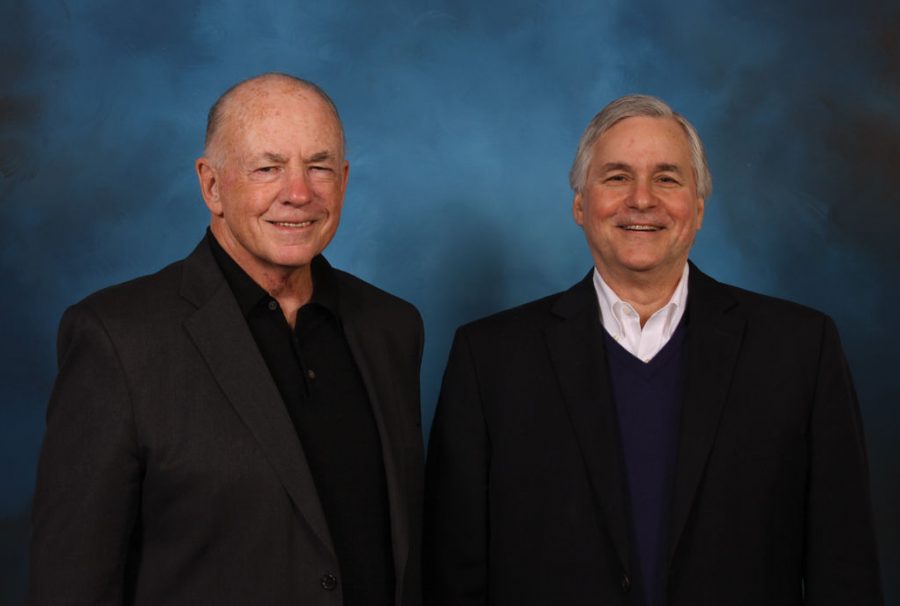Pitt faculty honored
November 20, 2014
Very little of what students learn in the classroom may apply to real-life campaigning, at least according to Pitt political science professor William Dunn.
Dunn is one of this year’s National Academy of Public Administration (NAPA) fellows and a former policy analyst and speechwriter for Ronald Reagan’s gubernatorial campaign in 1966. While his time spent on the campaign was a great professional experience, he recognized that he wanted to apply his political science education to other endeavors.
“In this case, I discovered how little of political science theory and research could be applied in political campaigns, particularly one driven by an ideology I did not personally support,” Dunn said.
NAPA, a Washington, D.C., nonprofit organization that advises government organizations to improve public management, inducted Dunn and his fellow Pitt professor John T. S. Keeler last Thursday as fellows. Dunn is a professor of public and international affairs, Keeler is the Dean of the Graduate School of Public and International Affairs.
“It is very gratifying to receive recognition of my research and professional service from such a distinguished organization,” Keeler said. “It also makes me feel fortunate to have worked with great colleagues without whom most of what I have achieved would not have been possible.”
Dunn said the induction is an “exceptional honor.”
Lisa Trahan, the Director of Fellow Relations at the NAPA, said there are 800 fellows nominated and elected each year by congresspeople, state and local government administrators and other academic scholars for their “substantial scholarly contributions in public administration.”
Keeler, an undergraduate alumnus of the University of Southern California who received his doctorate in political science from Harvard University, has been the Dean of Pitt’s Graduate School of International Affairs since 2007. He is a specialist of transatlantic relations, comparative policy public policy and European politics.
Before coming to Pitt in 2007, he was a political science professor at the University of Washington in Seattle and served as Director of the Center for West European Studies and the European Union Center of Excellence while there.
Keeler also won the American Political Science Association’s Gabriel A. Almond Award in 1979 and the University of Washington’s Distinguished Teaching Award in 1992.
Keeler’s research involves conducting data analysis and interviewing foreign policymakers.
“In retrospect, I made a very prudent choice of specialization, because conducting such research has allowed me to interact with fascinating people while also spending months in Paris, the French countryside (when I worked on agricultural policy), London, Oxford and other wonderful places,” Keeler said in an email.
Dunn has been a professor at Pitt since 1969. He teaches public and international affairs and has published several works on United States public policy.
Dunn’s motivation to apply research to policy solutions, he said, stems partly from his time spent as a research assistant to former member of the U.S. Foreign Service, Fred Warner Neal, who studied international economics, international relations theory and diplomatic history, and then linked these theories to foreign policy. Dunn said his time spent in the Peace Corps also inspired his career path.
“I have tried to transmit this spirit of public service to students and faculty, whose self-perception as social scientists sometimes fails to recognize that the social sciences sustain themselves by bringing theories, methods and data to bear on practical problems,” Dunn said.
Dunn said from his observation, much of the reading assigned in courses is “not easily or successfully linked to practice.”
Pitt’s Graduate School of Public and International Affairs has two other academy fellows on faculty: Professor Carolyn Ban, elected in 1997, and Professor Louise Comfort, elected in 2006.
Both fellow-elects said they are committed to making a difference in government and public policy.
“In my view, what connects theory and practice is the ethos of public service. This ethos is of special importance to the National Academy of Public Administration, which is an important balance to misleading and false views about what government does, how it does it and what difference it makes,” Dunn said.



